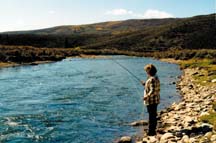By Sam Webb

A neighbor of mine fishes in Wyoming several times each summer. He says that he can be at Fontenelle or Viva Naughton just as fast as he can get to Scofield or Strawberry and by fishing in Wyoming he can leave the crowds behind.
He says that he catches some nice fish but because he never carries a camera and because he is strictly a catch-and-release angler, I’ve never seen any proof.
One day we were talking about stream fishing and he said that the Smiths Fork River in Wyoming was one of his favorite streams and that he always managed to catch some nice browns when he fished there.
The only Smiths Fork River I had ever heard of in Wyoming was the one that comes off the North Slope of the Uinta Mountains, through Stateline Reservoir and then into Wyoming. My neighbor said, "no, not that Smiths Fork, the one that flows into the Bear River just below Cokeville."
Now, I’ll have to admit, I’d never heard of this river so I made a mental note to check it out. Here’s what I found out. The Smiths Fork is good size, flows out of the Bridger-Teton National Forest parallel to and directly west of the Hams Fork River. The Hams Fork eventually turns and flows to the east and into the Blacks Fork and then into Flaming Gorge Reservoir while the Smiths Fork dumps into the Bear River just before it makes its big bend from north to south and flows into the Great Salt Lake.
The upper portion of the river has special regulations. All cutthroat trout 10 inches or less must be released and anglers must fish with artificial flies or lures only while fishing the Smiths Fork drainage on the Bridger-Teton National Forest (including Porcupine Creek). Downstream from the National Forest boundary statewide fishing regulations apply.
The lower portion of the creek is on private property and permission must be granted before you can fish there. As far as I could tell, the very best water is on the private property and it looked really good.
I didn’t try to find out who owns the property and to see if they allow trespass. I just figured it would be better to stay on the public land. One of the most popular stretches is directly upstream from where the road leaves the stream and the stream meanders off through a valley on the right-hand side of the road (as you travel upstream). This section requires a little hike, but should provide good fishing.
The upper section of the river has lots of cutthroat trout and whitefish. The numbers of cutts and whitefish diminish downstream and the browns become more abundant. The lower reaches of the stream are dominated by brown trout.
How to get there: If you are traveling from the Salt Lake City area, point your vehicle east on Interstate 80 and head to Evanston. Jump off the freeway in Evanston and pick up some snacks and a license. A one day Wyoming license costs just $6.00 and there are lots of convenience stores in Evanston that sell them.
Take Highway 89 out of Evanston and just keep on following it until you get to Cokeville. Turn on to Highway 232 right in the town of Cokeville and head north. You will be driving parallel to Smiths Fork River.
Not too far past where the pavement ends is where the public property begins. I recommend a high clearance vehicle to travel the dirt road but unless the road is wet a 4x4 isn’t necessary.
